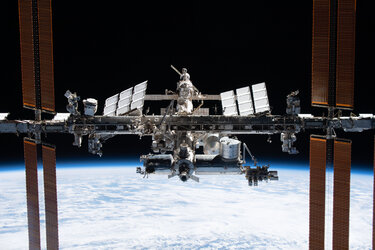Basic training
Every ESA astronaut starts the training cycle by completing the 12-month 'Basic training' at the European Astronaut Centre (EAC) in Cologne, Germany.
Basic training provides an overall familiarization with the future career as an ESA astronaut. It consists of four main training blocks:
1. Introduction
Provides a first orientation for the newly hired astronaut candidates. They receive an overview of the major spacefaring nations, their space agencies (with special emphasis on the European Space Agency) as well as of the major crewed and uncrewed space programmes. Space law and intergovernmental agreements governing the worldwide cooperation in space complete this first training block.
2. Fundamentals
Provides basic knowledge on various technical and scientific disciplines. This block brings all new astronaut candidates, who have different professional backgrounds and expertise, to a common minimum knowledge base in subjects of relevance for their future astronaut career.
It deals with technical disciplines such as spaceflight engineering, electrical engineering, aerodynamics, propulsion, orbit mechanics, materials and structures and it also includes an introduction to science disciplines like research under weightlessness (in human physiology, biology and material sciences), Earth observation, astronomy and others.

3. Space systems and operations
Provides a detailed overview of all Space Station onboard systems (e.g. ISS structure and design, guidance navigation & control, thermal control, electrical power generation and distribution, command and tracking, life support systems, robotic systems, systems for extra-vehicular activities, payload systems), as well as on the major systems of those spacecraft which service the ISS, such as US commercial crew vehicles (SpaceX and Boeing), and also includes ground systems like development and test sites, launch sites, training and control centres.
4. Special skills
Focuses on the training of important special skills such as generic robotic operations, rendezvous and docking, Russian language, human behaviour and performance and finally SCUBA diving as a first preparation for Extra Vehicular Activities (EVA or spacewalk) training.

ESA astronaut and former Belgian Air Force pilot Frank De Winne says, "You get some general ideas during the basic training; what is the ISS, what is it like to be an astronaut and what will my tasks be up there."
"To learn how to behave underwater is part of the basic skills that you need to do an EVA, or spacewalk. Every person who has to do an EVA needs to have a basic diving certificate because the conditions you work under when you are doing a spacewalk are similar to those you experience when you are diving," says De Winne.
For more about the SCUBA diving and EVA training, see the Neutral buoyancy EVA training article















 Germany
Germany
 Austria
Austria
 Belgium
Belgium
 Denmark
Denmark
 Spain
Spain
 Estonia
Estonia
 Finland
Finland
 France
France
 Greece
Greece
 Hungary
Hungary
 Ireland
Ireland
 Italy
Italy
 Luxembourg
Luxembourg
 Norway
Norway
 The Netherlands
The Netherlands
 Poland
Poland
 Portugal
Portugal
 Czechia
Czechia
 Romania
Romania
 United Kingdom
United Kingdom
 Slovenia
Slovenia
 Sweden
Sweden
 Switzerland
Switzerland




























